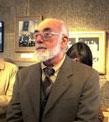The poetry of old Dublin

 Thomas Kinsella: A Dublin Documentary is a collection of poems and memories of an Ireland long past, where the church and the grandparent ruled; a retrospective journey through the difficult life of one of Ireland's most challenging poets. By Gerald Dawe.
Thomas Kinsella: A Dublin Documentary is a collection of poems and memories of an Ireland long past, where the church and the grandparent ruled; a retrospective journey through the difficult life of one of Ireland's most challenging poets. By Gerald Dawe.
Poetry sometimes starts off with an individual desire to vindicate the poet's own past, the people he or she comes from, the culture of their upbringing, to chastise these things, or simply to understand them. Approaching his 80th year in 2008, Thomas Kinsella's past, the world charted in the poems, commentary and photographs of this wonderful collection, A Dublin Documentary, is light years away from the hyper-reality of contemporary Dublin; or, for that matter, contemporary Ireland. In the nooks and crannies of these images, an entire civilisation seems to have shifted in place, like an iceberg breaking free of its mothering tundra. The sights and sounds of Liffey life, of Inchicore, the front room shops (a curious parallel with DH Lawrence's upbringing in Nottingham) and upstairs back rooms of his childhood are there. As well as the all-pervasive role of the Catholic church, the difficult self-belief of radical responses, and the under-felt of a nationalism that seemed to run aground in the new Irish state, are shadowed here with the story of hard work (if and when it was available).
Something else that we see in this poetry of ‘old' Dublin is the complex intimacy of local dependencies and the overarching influence of dominant grandfathers and grandmothers. Such continuity, the consciousness of family life and everyday living shaped by shared and common histories of generations named and known, is becoming much less an accepted, unselfconscious feature of Irish life, and increasingly more a thing of the past. In his magnificent opus on the new republic, ‘Nightwalker' (1968), Kinsella heralded the very beginnings and leading personalities, among with many other forces and themes, of the ‘Celtic Tiger', an abominable phrase but probably appropriate enough in the circumstances of the self-regarding world that emerged to dominate southern Ireland's economic, moral and cultural life 25 years later. What Kinsella went on to achieve in the intervening decades was a charting of the psychic and cultural fissures which had opened out in his own imagination.
A Dublin Documentary is a retrospective map of this difficult, elusive terrain, set in the context of a thoroughly different culture today, much more comfortable with easy sentiment, complaint and a superficial cosmopolitanism than with the intensities of Kinsella's vision. Kinsella has had no truck with such resorts. Criticised as a dark, brooding presence, questioned over the ‘anti-poetic' constructedness of some of his later work, rebuked for what is perceived to be an old-fashioned, discommoded nationalism, he stands like a mythic reminder of the last great generation of Irish modernists, such as Beckett, ‘outflanked' by a younger, worldlier generation borne aloft on the new winds of historical change. This is all probably only partly true, if even that. To read Kinsella is to become part of an imagined world, utterly true to itself. It is, as A Dublin Documentary amply illustrates, an urban industrialised world, not dissimilar from parts of Belfast, where both the micro landscapes of Liffey and Lagan are a throwback to the work practises that once dominated their inner cities.
Dublin, however, had been haunted by greatness, as the heroic desire of nationalism assimilated the remaindered political legacy of English imperialism. Whereas Belfast, in the civic grip of British self-awareness, had a more deep-seated sense of the pressure points of modernity. Now as these forces dwindle, and a different kind of Dublin (and Belfast) takes root, it is timely for those who want to know part of this city's actual history – of the lives lived, a history registered and imaginatively recreated – that we have a selective anthological view of Thomas Kinsella's version of it all. This is a challenging, honest and poignant view of growing up in 1930s Dublin, and of the shadowy historical world that flits through both landscape and memory. After leaving his job in the Irish civil service, which he had joined in 1946, and moving to the US in 1965, Kinsella's return, to set up home again in Dublin – leaving and returning again, a pattern of 40 years – is very much like the present younger generation, for whom, no matter where they are from or where they are going, this book would make a priceless gift of understanding.
Gerald Dawe's most recent poetry collection, Lake Geneva, was published in 2003. A volume of collected essays, The Proper Word: Ireland, poetry, politics is forthcoming. He teaches at Trinity College, Dublin
